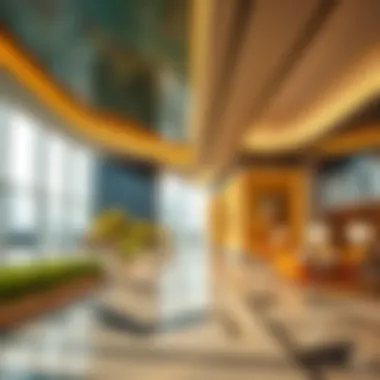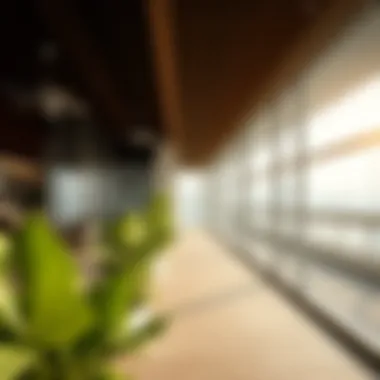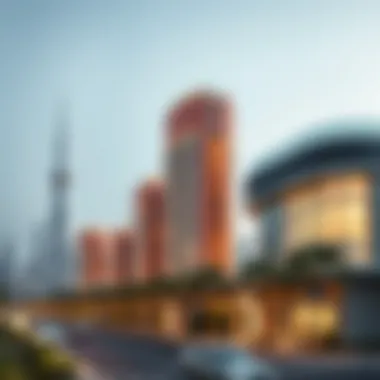Exploring Dubai's Real Estate Opportunities Ahead


Intro
Dubai, a city that’s no stranger to glitz and glamour, has also made a name for itself in the real estate sector. Over the years, it has become a hotspot for both investors and buyers seeking lucrative opportunities. As a well-rounded player in the global property game, understanding the ins and outs of Dubai's real estate landscape is not just beneficial – it’s essential.
The intricacies of this market can be compared to navigating a winding road; there are sharp turns, enticing sights, and moments of uncertainty. But those willing to take the journey often find that the view is well worth the drive. This article dives into the depths of the current trends, investment insights, and offers detailed analyses of various neighborhoods, aiming to shed light on the complexities that surround engaging with Dubai's diverse property market.
Understanding Dubai's Real Estate Market
Dubai has established itself as an attractive hub for real estate investments and a beacon for expatriates seeking to establish a foothold in the Middle East. Understanding the dynamics of Dubai's real estate market is essential for anyone looking to buy or invest in property in this vibrant city. The market has unique characteristics, influenced by various economic, social, and cultural factors, that make it distinct from other global markets.
One of the primary benefits of grasping the nuances of Dubai's real estate landscape is the potential for significant financial returns. The city has gained global recognition for its jaw-dropping skyscrapers and luxury developments. Knowing where and when to invest can lead to higher yields and capital appreciation. Additionally, the influx of expatriates and tourists creates a high demand for rentals, which can provide a steady stream of income for property owners.
As we delve deeper into the market, there are specific elements to consider. The historical context sheds light on the evolution of the market, illustrating how Dubai transformed from a trading port into a modern metropolis over the last few decades. Next, assessing current market trends allows potential investors to get a grasp of where the market stands today, along with understanding price fluctuations and buyer behaviors. Finally, forecasting future developments highlights upcoming projects and trends that could shape the market in the coming years.
"Knowledge is power, especially when it comes to navigating complex investment landscapes."
This leads us to the historical context of Dubai's real estate market, an essential element for understanding how we arrived here today.
Historical Context
The journey of Dubai's real estate market dates back several decades. Initially, there was little to establish what we see today. The city's strategic location as a trade hub attracted merchants from across the globe, but the real estate boom began in earnest during the late 1990s.
In 2002, the government introduced an initiative allowing foreign ownership of property in designated areas. This marked a sea change, leading to an influx of foreign investors and expats seeking residential and commercial spaces. Fast forward to the 2008 financial crisis, which saw a significant dip in property prices, offering opportunities for savvy investors to purchase properties at undervalued prices.
The market rebounded with new regulations, a growing expatriate community, and Dubai's ambition to host global events such as Expo 2020, which has further stimulated developments in infrastructure and real estate.
Current Market Trends
Right now, Dubai's real estate market is characterized by several key trends. The resurgence post-COVID-19 has reignited interest in property investments. Affordability is a major focal point, with developers increasingly focusing on mid-range and affordable housing options to cater to a broader audience.
Furthermore, there’s a noticeable shift toward remote work, influencing demand dynamics. Many people, having experienced the freedom of working from anywhere, are now looking at luxury villas and larger living spaces instead of high-rise apartments.
Another trend is sustainability. Developers are crafting properties that focus on energy efficiency and environmental friendliness. Innovations in technology have sprung up, making smart homes and eco-friendly designs more commonplace.
Forecasting Future Developments
Looking ahead, the horizon for Dubai's real estate market appears promising. With the city’s ongoing commitment to sustainability and the vision to become one of the world's top smart cities, expect to see an influx of green buildings and smart technologies.
The introduction of new infrastructural projects, including the much-anticipated expansion of the Dubai Metro and new airport terminals, will enhance connectivity and desirability of various neighborhoods. Additionally, the upcoming World Expo facilities are likely to be repurposed into residential and commercial spaces, further stimulating the market.
With investment opportunities increasing, potential investors must keep an ear to the ground, paying attention to shifts in regulations and buyer preferences. Understanding where the market is heading can be crucial in defining success in real estate investments in Dubai.
Types of Properties in Dubai
Dubai's real estate market is a veritable cornucopia of options, each serving different needs and investment strategies. Understanding the types of properties available in this glittering metropolis is key for investors, expatriates, and buyers alike. Every type carries its unique set of considerations, benefits, and potential returns. Let's delve deeper into each category and explore what makes them significant in this dynamic landscape.
Residential Properties
Residential properties are the backbone of Dubai’s housing market, catering to a diverse population that includes expatriates and Emirati families. These properties can range from high-rise apartments to villas in gated communities. The key characteristic here is variety; whether you're looking for a cozy studio or a sprawling family home, there's something to fit every lifestyle and budget.
One must consider the area's amenities, accessibility to public transport, and the overall community vibe when choosing a residential property. Would you prefer a bustling neighborhood with cafes and day-to-day conveniences, or perhaps a quieter suburban area?
Commercial Investments
Commercial properties are the crown jewels for many investors looking at Dubai. These investments can be anything from retail shops in busy districts like Dubai Mall to office spaces in the renowned Business Bay. They often promise higher returns compared to residential properties due to the demand from both local and international businesses.
Investing in commercial real estate means paying attention to factors like lease agreements, foot traffic, and market trends. The profit potential can be significant, but it's essential to also consider the economic fluctuations that can affect business operations.
Luxury Real Estate
When it comes to luxury real estate, Dubai doesn't hold back. This segment includes everything from iconic towers to gated villa communities, showcasing opulence and exclusivity. Let's take a closer look:
High-end Apartments
High-end apartments in Dubai are synonymous with luxury living. These developments often come equipped with high-end amenities, including swimming pools, gyms, and high-end finishes. A pivotal aspect to note is their location; many are nestled in vibrant neighborhoods like Dubai Marina or Downtown Dubai, offering spectacular views and easy access to attractions.
However, while these apartments can offer good returns on investment, the cost of maintenance and service charges can be considerable. They cater primarily to a niche market looking for both primary residences and investment opportunities, ensuring demand remains relatively stable.
Villa Communities
Villa communities represent a serene alternative to high-rise living, providing spacious homes with private gardens and community amenities. Popular areas like Arabian Ranches and Jumeirah Golf Estates offer a blend of luxury and community, making them desirable for families or those looking for a more tranquil lifestyle.
These communities often feature exquisite communal areas such as parks, pools, and golf courses which are a huge draw. Again, on the flip side, the larger initial investment can be a barrier for many potential buyers, and associated costs can vary widely.
Iconic Developments
Last but certainly not least, we've got the iconic developments, such as the Burj Khalifa residences and Palm Jumeirah villas. These properties symbolize Dubai's ambitious skyline and unique architectural style. They often represent the epitome of luxury and exclusivity, attracting attention from high-net-worth individuals worldwide.
Owning a property in such developments often comes with prestige and the potential for high ROI, thanks to their well-known status. However, such exclusivity often comes at a price, both in terms of purchase and upkeep.
"Dubai’s real estate sector is not just about bricks and mortars; it’s about lifestyle choices and investment potential in a city that never ceases to amaze."
In summary, each type of property in Dubai offers different advantages, investor profiles, and lifestyle options. Understanding these nuances allows potential buyers to make informed decisions that align with their goals, whether they are seeking homes or investment opportunities.
Navigating Neighborhoods


Understanding neighborhoods is crucial in the context of Dubai's vibrant real estate market. Each area has its own flavor and unique characteristics that cater to different lifestyles and preferences. For investors, knowing where to buy or rent can make or break their portfolios. For expatriates and buyers, it’s about finding a spot that feels comfortable in a new setting.
Popular Areas for Expatriates
With a high expatriate population, Dubai boasts neighborhoods that are particularly inviting for newcomers. Here are some popular areas.
Dubai Marina
Dubai Marina is a bustling waterside district, known for its modern high-rises and sleek lifestyle options. It serves as a hub for young professionals drawn to its vibrant nightlife and numerous dining choices. The key characteristic here is the marina itself, which not only offers stunning views but also recreational activities like boating and water sports. Living in Dubai Marina provides residents with a lifestyle that feels both luxurious and conveniently urban.
"Dubai Marina feels like its own little city, complete with a breathtaking waterfront!"
The unique feature of this area is the promenade, which beckons joggers, walkers, and families alike, creating a sense of community amid a cosmopolitan backdrop. However, one must consider the disadvantage of the high rental prices that can deter budget-conscious buyers.
Downtown Dubai
Famous worldwide for landmarks like the Burj Khalifa and Dubai Mall, Downtown Dubai is a prime area for those who thrive in an energetic environment. The key characteristic of this neighborhood is the sheer accessibility to shopping, dining, and cultural experiences. It's a beating heart of the city for both work and play.
The unique feature of Downtown Dubai is its blend of high-end retail and leisure activities, ensuring that there's never a dull moment. Its popularity, though, comes with a downside—higher living costs compared to neighboring areas, which might stretch an investor’s budget.
Jumeirah
Jumeirah stands out as one of the more family-friendly neighborhoods in Dubai. It's known for its lush beach fronts and expansive villas. The key characteristic here is the community feel that makes it ideal for expatriates with families, offering schools and recreational parks.
With unique features like private beach access and cultural landmarks, Jumeirah marries relaxation with a vibrant community. As a potential disadvantage, some areas can feel a bit isolated from the city's hustle and bustle, which might not appeal to everyone, particularly younger professionals.
Emerging Neighborhoods
As Dubai continues to expand, several emerging neighborhoods present fascinating opportunities for buyers and investors.
Dubai Creek Harbour
Dubai Creek Harbour represents the future of urban living with its focus on sustainability and community. The key characteristic here is its proximity to the picturesque creek, which fosters a connection with nature that’s rare in Dubai. This area aims to offer a balance of residential, commercial, and public spaces, making it appealing for those seeking a holistic lifestyle.
The unique feature is the upcoming Dubai Square, a massive commercial hub set to elevate shopping and dining experiences. However, currently, the disadvantage is that it is still developing, which means some amenities are not yet readily available.
Dubai Hills Estate
Hailed as a “city within a city,” Dubai Hills Estate is designed with family living in mind. The key characteristic is the green spaces and parks that provide a refreshing break from the urban environment. Families with children often look favorably at this neighborhood due to the planned schools and hospitals.
The unique feature of having a golf course integrated into the community makes it stand out. On the flip side, while offerings are designed for long-term living, the disadvantage of distances can mean commuting is vital for those working elsewhere.
Al Furjan
Al Furjan is quickly becoming a sought-after location due to its balanced lifestyle. The key characteristic is its community-oriented design, with clusters of homes surrounding shared facilities. This neighborhood attracts both families and singles drawn to its affordable housing options.
A unique feature of Al Furjan is that it combines residential zones with shops and cafes, creating a cozy atmosphere. Still, it’s important to consider that its development is ongoing, posing a potential disadvantage for those wanting immediate access to all the bells and whistles of a fully established neighborhood.
In summary, knowing how to navigate the neighborhoods within Dubai is a vital part of making informed decisions in the real estate market, whether you're an investor looking for potential growth or an expatriate seeking a new home.
Legal Considerations for Buyers
When delving into the intricacies of Dubai's real estate sector, understanding the legal considerations for buyers cannot be overstated. Navigating through this complex landscape requires a grounding in the local laws and regulations, which vary significantly from other markets. Buyers must familiarize themselves with ownership rights, the regulatory framework, and the precautions needed before executing contracts. These factors act as both a guide and a shield, ensuring that investments are not only fruitful but also secure.
Understanding Ownership Laws
In Dubai, the ownership laws were revitalized with the introduction of freehold property laws in 2002. This opened avenues for foreigners to own property in designated areas. It’s crucial for buyers to realize that understanding these laws is their first line of defense against potential pitfalls. Freehold ownership allows outright ownership, while leasehold agreements typically lack the same permanence.
- Freehold Properties: Full ownership is granted, permitting sale, transfer, and modification.
- Leasehold Properties: Ownership usually lasts for 99 years, after which rights revert to the original owner.
This distinction can significantly influence long-term investment strategies. Additionally, compliance with the Dubai Land Department's regulations assures that transactions are above board, adding another layer of assurance for investors.
Regulatory Framework
The operational backbone of Dubai's property market is its regulatory framework. The Dubai Land Department (DLD) plays a pivotal role in maintaining order, overseeing all real estate transactions. Buyers should be aware of what encompasses this framework:
- Registration Fees: Typically, buyers are responsible for paying a fee that can range from 4% of the purchase price, plus additional administrative fees.
- Title Deeds: Mandatory documentation signifies legitimate ownership. Without it, a purchase is akin to a ship without a sail - directionless.
- Escrow Accounts: Most purchases nowadays require using an escrow account to protect buyer funds before contractual commitments fully materialize.
Falling short of grasping these regulations may lead to costly errors. Therefore, it's prudent to consult legal experts specializing in UAE real estate.
What to Know Before Signing Contracts
Signing on the dotted line is often where buyers become the most unwittingly vulnerable. Contracts in Dubai's real estate sector can be laden with jargon that can easily trip up even seasoned investors. Here are several key aspects to scrutinize:
- Clauses: Familiarize oneself with every detail, especially in terms of penalties for non-compliance or delays.
- Completion Dates: Ensure that timelines are clear and binding, as developers might not always adhere to project completion schedules.
- Financing Conditions: If your buying journey entails a mortgage, confirm that the contract reflects all financing terms accurately.
"A well-prepared contract is like having a map in uncharted waters; it helps avoid disasters.
In short, due diligence in examining contracts shouldn’t be treated as optional—it's essential.
Overall, these legal considerations form the bedrock of a successful investment in Dubai's bustling marketplace. Buyers armed with the right knowledge ensure they can navigate this vibrant terrain confidently.
Financing Options for Investors
When stepping into Dubai's real estate market, understanding the financing options available is vital. These options can not only ease the financial burden of purchasing property but can also significantly affect the overall return on investment. Investors need to be aware of the mechanisms surrounding mortgages, alternative funding sources, and how they intersect with the local market dynamics. This section will explore various financing channels, ensuring that potential buyers or investors have a rounded perspective before making decisions.


Mortgage Processes in Dubai
Getting a mortgage in Dubai can be a breeze or a bit trying, depending on how you approach it. The mortgage process in Dubai is pretty structured but allows for some flexibility, catering to both expats and locals.
First off, you'll want to know the key players: banks, mortgage brokers, and financial advisors. Each has a role in determining what suits your financial situation best. Typically, banks in Dubai offer a maximum of 80% of the property’s value for UAE nationals, and around 75% for expats; this is often a crucial detail for budget planning.
The process involves a few steps or checks:
- Pre-approval: Before you start house-hunting, it pays to get pre-approved. It saves a lot of hassle down the line.
- Documentation: You’re going to need a robust portfolio of documents: salary proof, bank statements, and identification, among others.
- Property appraisal: Banks require a valuation of the property. That helps them gauge the risk of lending the money.
- Finalizing the mortgage: Once all the ducks are in a row, you can finalize your mortgage with the bank.
It's important to shop around for the best rates. Different banks have varying fees and terms, so comparison can save a lot of dough.
Investment Financing Alternatives
For those who want to diversify their investment strategies beyond traditional mortgages, there're significant alternatives available in Dubai.
Private Investors
Private investors can be an appealing route for financing property investments. These investors often have fewer restrictions compared to traditional banks. When you're in a bind or need a quick influx of cash, dealing with private investors could be a timely solution.
Here’s what stands out about private investors:
- Key Characteristic: They usually operate faster and more freely, which might be beneficial if you need to close a deal quickly.
- Advantages: Often, private investors are more flexible with terms, allowing potential for negotiating repayments or even interest rates.
- Disadvantages: However, it’s a double-edged sword; interest rates can be significantly higher, which could turn costly if not managed properly.
For folks looking for a personalized touch in their investments, they may find private investors a strong fit.
Real Estate Funds
On the flip side, real estate funds offer a structured way to pool resources for investments, accommodating both seasoned and novice investors. These funds typically invest in several properties, allowing investors to share in the risk and rewards.
- Key Characteristic: Real estate funds are professionally managed, meaning you don’t have to stress over the daily management of the property.
- Advantages: They provide diversification, spreading your capital across various properties to mitigate risk significantly.
- Disadvantages: The downside is that these funds can have high entry costs, and fees may eat into your returns. Transparency can also be an issue if you’re not dealing with reputable funds.
"Financing your investment smartly is as crucial as choosing the right property. Your financial plan sets the stage for success."
For more in-depth information, check out Dubai Land Department and explore additional resources on real estate trends through Investopedia as they provide valuable insights into property investments.
Market Entry Strategies
Navigating the real estate landscape in Dubai is much like steering a ship through ever-changing waters. Market entry strategies are your navigational compass. They illuminate the path, guiding investors, expatriates, and buyers through a complex environment. Each strategy carries specific elements, benefits, and considerations that can significantly affect outcomes in Dubai’s vibrant market.
Choosing the Right Property
When it comes to selecting a property in Dubai, it’s essential to conduct thorough research that aligns with your investment goals. Properties come in all shapes and sizes, from high-rise apartments in Downtown Dubai to luxurious villas in Jumeirah. It helps to define what you seek—be it rental returns, long-term capital gains, or personal use. Visiting potential properties can provide a sense of their location and amenities, something digital listings might miss. Prioritize understanding the neighborhood’s dynamics as this can have lasting implications on property value.
Key Factors to Consider:
- Location: Real estate is often about location. Areas near public transport, schools, and shopping centers might fetch better returns.
- Amenities: Pool, gym, parking—what you value can influence your choice between a smaller home and one luxuriously equipped.
- Market Demand: Research which types of properties are presently in demand. Consult local listings and talk to residents.
Timing the Market
Timing isn’t just essential in financial markets; it’s critical for real estate as well. Dubai has seen fluctuations in property prices driven by economic cycles, tourism, and global events. For instance, the market tends to heat up before major events like Expo 2020, leading to increased demand and prices. Knowing when to buy can be the difference between success and disappointment.
Strategies for Effective Timing Include:
- Economic Indicators: Keep an eye on Dubai’s economic performance and policies, as they often signal changes in property performance.
- Market Cycles: Understanding the cyclic nature of real estate can help you identify whether prices are at a peak or nearing the bottom.
- Seasonal Trends: Often, rental markets see varying demand throughout the year, particularly during holiday seasons when expats tend to relocate.
Engaging Real Estate Agents
A professional real estate agent in Dubai can be an invaluable asset. They’re often akin to local guides, leading you through the labyrinth of options and paperwork. Selecting the right agent means finding someone who understands your needs and possesses a keen grasp of the local market.
Consider these points when choosing an agent:
- Reputation and Trustworthiness: Look for agents with proven track records. Online reviews can help gauge their credibility.
- Local Expertise: A knowledgeable agent will help you navigate different neighborhoods while keeping your specific preferences in mind.
- Transparency: A good agent should provide clear information on fees, commissions, and potential issues regarding the property.
Engaging a skilled agent can streamline the process and minimize potential pitfalls, leading to a swifter and more informed investment decision.
"A successful entry into the Dubai real estate market requires meticulous planning and strategic insight."
Understanding Rental Dynamics
Understanding the rental dynamics of Dubai's real estate market is crucial for anyone considering investments or residency in this bustling metropolis. The rental market in Dubai is characterized by a unique mix of short-term and long-term rental opportunities, each catering to different needs, preferences, and financial strategies. This section will delve into the intricacies of rental dynamics, offering insights into how market rates fluctuate, the influence of demand, and the benefits and considerations for renters and investors alike.
Short-term vs. Long-term Rentals
When it comes to rentals in Dubai, the options typically fall into two major categories: short-term and long-term rentals. Each type of rental serves different purposes and attracts varied clientele, resulting in distinct market behaviors.
Short-term rentals are generally geared towards tourists or business travelers looking for temporary stays. These rentals are popular in tourist-heavy areas such as Dubai Marina or Downtown Dubai. Here, vacationers can find fully furnished apartments or villas available for rental durations ranging from a few days to several months. This flexibility often comes with a price, as the rental rates for short-term accommodations tend to be significantly higher per night compared to their long-term counterparts.
On the other hand, long-term rentals are suited for individuals or families seeking more stability. These leases typically extend for a year or more, which can be financially advantageous. Renters often prefer long-term options in peaceful neighborhoods like Jumeirah or Al Furjan, where they can enjoy a sense of community and lower rates compared to transient accommodations.
If you're weighing your options, it's worth noting that:
- Short-term rentals can yield higher immediate returns for property owners, thanks to the premium pricing.
- Long-term rentals often equate to more consistent income, as well as reduced overhead costs related to property management and marketing efforts.
- Local regulations may also affect the operations and profitability of short-term rentals, necessitating familiarity with the legal landscape.
Market Rates and Demand


The rental market in Dubai is markedly influenced by changes in market rates and overall demand, which can shift based on a variety of factors.
One key driver of demand in the rental market is the city's ever-evolving demographic landscape. As Dubai attracts professionals from around the globe, the need for quality housing options continues to increase. This influx of expatriates works in tandem with seasonal trends, often leading to spikes in demand during the winter months, when tourism peaks.
According to recent market analyses:
"Rental price trends in Dubai show a steady increase, particularly in districts favored by expats, signaling a robust demand for both short-term and long-term accommodations."
Factors influencing market rates include:
- Neighborhood Appeal: Locations near key amenities like shopping malls, schools, and transportation hubs command higher rents.
- Economic Conditions: Economic growth and stability tend to lead to higher demand, which in turn can drive up rental prices.
- Property Quality: Newly developed or renovated properties typically fetch higher rental rates, as they offer modern amenities that align with the expectations of today's renters.
Cultural Considerations
Cultural awareness sits at the heart of navigating the real estate landscape in Dubai. As a melting pot of traditions and modernity, the cultural milieu influences everything from property types to investment approaches. For investors, expatriates, and real estate agents, appreciating the local culture can lead to better decision-making and more fruitful engagement with the market. An understanding of cultural nuances provides a foundation upon which successful transactions can be built, steering clear of pitfalls and enhancing collaboration.
Understanding the Local Culture
Dubai's culture is a fascinating blend of ancient traditions and contemporary lifestyle. The UAE's heritage is steeped in Bedouin customs, Islamic values, and a remarkable openness to international influences. This combination creates a unique backdrop against which real estate transactions unfold.
It is essential for newcomers to Dubai to grasp the significance of values such as hospitality, respect for elders, and family structures. Engaging with locals can yield valuable insights, revealing how these cultural tenets affect property ownership or leasing practices. For instance, respecting privacy is paramount; buyers should avoid overly intrusive inquiries during negotiations.
When considering property, it’s also vital to recognize the diverse communities that populate Dubai—these communities often reflect their home countries’ cultural practices and preferences. Buyers seeking residential properties may find specific neighborhoods more aligned with their cultural backgrounds, making it easier to settle in and feel at home.
Navigating Social Norms
Understanding social norms in Dubai enhances the ability to build rapport and trust. When interacting with locals or potential partners, it is important to communicate with a sense of formality tempered by approachability. A simple greeting in Arabic, such as "As-salamu alaykum" (Peace be upon you), can go a long way in establishing goodwill.
Additionally, familiarity with local customs can make or break a deal. Public displays of affection, for example, may be frowned upon, and maintaining a modest demeanor in public settings is crucial. Observing Ramadan, the holy month of fasting, can also influence interactions, especially regarding timing for meetings and celebrations.
Moreover, adapting to local dining customs can also enhance social relations. For example, understanding the significance of sharing meals—often with a focus on communal dishes—can create deeper connections. If invited to a local gathering, arriving punctually and bringing a small gift is considered a sign of respect and appreciation.
"Cultural consideration isn't just a courtesy—it's a business strategy. An understanding of cultural norms can enhance market entry success by ensuring respectful and mutually beneficial interactions."
Understanding these cultural dimensions is essential for thriving in Dubai’s real estate market. It transforms real estate dealings from mere transactions into meaningful connections, ultimately fostering a sense of community vital for long-term investment success.
For further reading on Dubai's rich cultural context, you might explore resources like Wikipedia or Britannica.
By recognizing and respecting the cultural fabric of Dubai, investors, expatriates, and real estate professionals can better navigate the complex landscape and unlock numerous opportunities.
Sustainability in Dubai's Real Estate
As the world leans increasingly towards sustainable practices, it’s hard to ignore the shift happening in Dubai's real estate arena. This aspect not only showcases the emirate's commitment to a greener future but also addresses the demands of today’s global investors. Sustainability in real estate means more than just erecting buildings; it’s about creating living environments that balance economic growth with ecological preservation.
Investors and potential buyers alike should consider sustainability as a core element rather than a mere afterthought. Here’s the thing: properties designed with sustainable principles often yield long-term benefits. They command better rental prices, attract eco-conscious tenants, and inherit additional value in a market that's progressively favoring green technologies. With a unique blend of local culture and an appetite for modernity, Dubai has positioned itself as a pioneer in sustainable urban development.
Current Green Initiatives
Dubai has rolled out several initiatives aimed at embedding sustainability in the city’s fabric. One prominent measure is the Dubai Clean Energy Strategy 2050, which aims to make Dubai a global center for clean energy and green economy. This ambitious plan targets generating 75% of the emirate’s energy requirements from clean sources by 2050.
Another noteworthy initiative is the Estidama system, promoting sustainable building practices through stringent guidelines. It evaluates each development’s environmental impact, ensuring they contribute positively to the community and the environment. With this framework, developers are encouraged to incorporate energy-efficient designs, minimize waste, and enhance water use efficiency.
Additionally, the introduction of sustainable urban parks and green roofs contributes to urban biodiversity and offers leisure options for residents, blending nature with urban living. Such features not only improve air quality but also encourage a healthier lifestyle.
Future Directions Towards Sustainability
Looking ahead, Dubai is exploring innovative ideas that might revolutionize its real estate landscape. For starters, integrating smart technology in buildings stands out as a key focus. Imagine homes that optimize energy use through advanced sensors and intelligent systems. These properties not only reduce costs for residents but also contribute significantly to energy conservation efforts across the emirate.
Another exciting prospect is the further deployment of renewable energy solutions in residential and commercial spaces. Solar panels, for instance, are gaining traction as costs decline and public awareness about clean energy rises. The government’s investments to encourage installations reflect a commitment to sustainability.
Moreover, potential investors can anticipate a growing demand for eco-friendly materials and practices in construction. Developers would need to pivot towards techniques like modular construction, which enhances efficiency and minimizes waste, catering to the evolving preferences of a market that values environmental responsibility.
As the world keeps pivoting towards sustainable solutions, these trends signify Dubai’s pledge to remain ahead of the curve in the real estate sector.
"Incorporating sustainability into real estate is not just altruism; it's a smart business decision for a future-focused market."
By carefully knitting sustainability into the city’s framework, Dubai is setting up not just for today’s investors but for generations to come. The emphasis is on striking that perfect balance—where economic viability, ecological awareness, and modern urban living meld into one vibrant community.
End
When it comes to the journey through Dubai's real estate market, reaching the conclusion is akin to crossing the finish line of a marathon. It's crucial because it brings together all the threads woven throughout the article, highlighting the insights gained and the themes explored. This section is where one can clearly see the intricate dance of opportunity, investment, and cultural nuances that define Dubai's property landscape.
Understanding the implications drawn from key insights discussed previously is essential. For investors, keen comprehension of the local market dynamics, neighborhood appeal, and regulatory frameworks can make the difference between a wise purchase and a regrettable mistake.
Summary of Key Insights
Just as a skilled chef tastes their dish before serving, let’s digest the core insights presented:
- Market Evolution: Dubai’s real estate landscape has evolved from transitory investments to a long-term destination for families and expats, rooted in solid infrastructure and global connectivity.
- Diverse Options: Buyers and investors have a wealth of choices, from luxury properties like the Burj Khalifa residences to emerging neighborhoods such as Dubai Hills Estate that promise promising future growth.
- Legal Framework: Familiarizing oneself with local ownership laws and contractual obligations is paramount to safeguarding investments. Clarity here can prevent unwelcome surprises later.
- Sustainability Stakes: There's an increasing push towards sustainable living, which not only echoes global sentiments but also aligns with local government initiatives to foster an eco-friendly real estate scene.
These insights do not just scratch the surface; they encourage investors to dig deeper into their own strategies, tailoring them in a way that resonates with this unique market.
Final Thoughts on Investment Opportunities
In a city as vibrant and unpredictable as Dubai, spotting investment opportunities requires a combined innate intuition and research acumen. Understanding the cultural fabric, market trends, and potential future developments empowers buyers and investors to make educated decisions.
Here are some key elements to consider moving forward:
- Timing the Market: Keeping an eye on the market fluctuations and timing your entry can greatly impact the ROI.
- Localized Knowledge: Engaging with local experts—real estate agents, legal advisors, and consultants—can provide insights that online research simply cannot unveil.
- Diversifying Investment: Instead of putting all your eggs in one basket, consider various types of properties across different neighborhoods.
Above all, the conclusion of this journey is not merely an end but an invitation to explore the next steps. The insights shared are seeds for new opportunities that can burgeon into significant investments. For those brave enough to embrace the possibilities, Dubai's real estate market offers a horizon filled with promise and potential.











